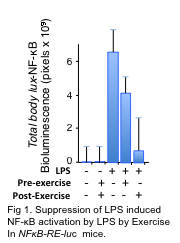Session Information
Session Type: Abstract Submissions (ACR)
Background/Purpose: Inflammation is integral to joint damage and bone erosion in rheumatoid arthritis. We reported previously that physiologic levels of exercise are anti-inflammatory and suppress local inflammation of joints in vivo. Here, we demonstrate that the physiological levels of exercise are potent systemic biological response modifiers that block monocyte/macrophage activation.
Methods: Mice carrying a transgene containing a modified firefly luciferase cDNA whose expression is under the control of NF-κB responsive elements were used to study the regulation of NF-κB activation by exercise (treadmill walking at 8M/min). LPS (1 µg/gm body weight) was injected in the paw to trigger inflammation. The mice were treated as follows: (i) no treatment (ii) exercise alone, (iii) LPS alone, (iv) pre-exercised (Pre-Ex) for 7 days prior to LPS injection, or (v) exercised post LPS injection (Post-Ex). Activation of NF-κB was assessed following LPS injection by digitizing bioluminescent activity. Multiplex ELISA was used to assess the induction of cytokines in the serum. Human macrophages were enriched from healthy peripheral blood and subjected to Interferon-γ and LPS stimulation +/- dynamic strain (2% at 0.5 Hz) for various time intervals to assess NF-κB activation.
 Results: Exercise alone did not induce significant NF-κB activation; whereas LPS injection in the right ankle provoked a robust systemic and local inflammatory response that was most severe within 2 h post-injection. Both Pre-Ex and Post-Ex mice showed a significant inhibition of LPS-induced NF-κB activation (Fig 1). As expected, the NF-κB activation was primarily in lymphatic tissue and at the site of LPS injection. Strikingly, exercise effectively suppressed LPS-induced NF-κB activation in all lymphatic tissues examined and at the site of injection. We next examined the tenacity of the effects of exercise and demonstrated that the anti-inflammatory response is transient, lasting only 24 h post-exercise. Assessment of the consequences of NF-κB inactivation by exercise (Both Pre-Ex and Post-Ex) revealed the suppression of multiple pro-inflammatory cytokines: IL-1β, TNF-α, IL-6, IL-17, IL-12 and IL-8. However, the effects of exercise were more dramatic (<90%) in Post-Ex than Pre-Ex mice. Using primary human macrophages, dynamic strain significantly suppressed NF-κB activation.
Results: Exercise alone did not induce significant NF-κB activation; whereas LPS injection in the right ankle provoked a robust systemic and local inflammatory response that was most severe within 2 h post-injection. Both Pre-Ex and Post-Ex mice showed a significant inhibition of LPS-induced NF-κB activation (Fig 1). As expected, the NF-κB activation was primarily in lymphatic tissue and at the site of LPS injection. Strikingly, exercise effectively suppressed LPS-induced NF-κB activation in all lymphatic tissues examined and at the site of injection. We next examined the tenacity of the effects of exercise and demonstrated that the anti-inflammatory response is transient, lasting only 24 h post-exercise. Assessment of the consequences of NF-κB inactivation by exercise (Both Pre-Ex and Post-Ex) revealed the suppression of multiple pro-inflammatory cytokines: IL-1β, TNF-α, IL-6, IL-17, IL-12 and IL-8. However, the effects of exercise were more dramatic (<90%) in Post-Ex than Pre-Ex mice. Using primary human macrophages, dynamic strain significantly suppressed NF-κB activation.
Conclusion: These findings suggest that exercise suppresses both local and systemic inflammation by inhibiting NF-κB activation in monocytes/macrophages. Importantly, these effects are transient, which supports the need for a regular exercise routine in order to achieve clinical efficacy. Our results (i) demonstrate that the signals generated by exercise are true biological response modifiers and (ii) provide the molecular basis for the actions of exercise in suppressing the inflammation observed in rheumatic diseases.
Disclosure:
A. Blazek,
None;
D. Knapik,
None;
L. C. Wu,
None;
N. A. Young,
None;
W. N. Jarjour,
None;
S. Agarwal,
None.
« Back to 2013 ACR/ARHP Annual Meeting
ACR Meeting Abstracts - https://acrabstracts.org/abstract/exercise-suppresses-systemic-inflammation-via-inhibition-of-nf-%ce%bab-activation-in-monocytes/
